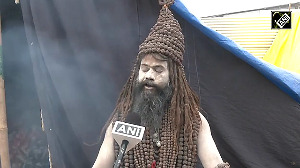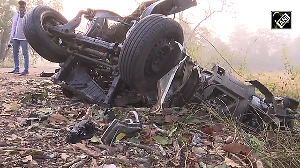A whistleblower who tries to highlight malfunctioning of the government "should not be silenced" even if the speech or editorials appear to invite contempt of court and truth should ordinarily be allowed as defence, the Supreme Court ruled on Friday.
"If a speech or article, editorial contains something which appears to be contemptuous and this court or the high court is called upon to initiate proceedings under the Contempt of Court Act.
"The truth should ordinarily be allowed as a defence unless the court finds that it is only a camouflage to escape the consequences of deliberate or malicious attempt to scandalise the court or is an interference with the administration of justice," a Bench comprising Justices G S Singhvi and A K Ganguly said.
The judgment came three days after the Union Cabinet approved a Bill to give protection to whistle blowers.
The ruling came on a petition of Indirect Tax Practitioners Association seeking prosecution of R K Jain, Editor of Excise Law Times, for writing articles which allegedly scandalised the functioning of a tax tribunal, CESTAT.
"In our view, a person like the respondent can appropriately be described as a whistleblower for the system who has tried to highlight the malfunctioning of an important institution established for dealing with cases involving revenue of the state and there is no reason to silence such person by invoking Articles 129 or 215 of the Constitution or the provisions of the Act," the Bench said.
The Bench appreciated the editorial which highlighted the irregularities in the appointment and posting of the member of CESTAT (Customs Excise and Service Tax Appellate Tribunal) by rejecting the allegation of lawyers' body it was aimed at
scandalising the function of the tribunal.
"Although, the petitioner has tried to project the editorial as a piece of writing intended to demean CESTAT as an institution and scandalise its functioning, we do not find anything in it which can be described as an attempt to lower the authority of CESTAT or ridicule it in the eyes of the public.
"Rather, the object of the editorial was to highlight the irregularities in the appointment, posting and transfer of the members of CESTAT and instances of the abuse of the quasi-judicial powers," Justice Singhvi, writing the judgment for the Bench, said.
The Bench noted that the Association failed to suggest that the editorial was incorrect or the Editor presented a distorted version of the facts.
There is no warrant for discarding the Editor's assertion that whatever he has written is based on true facts and the sole object of writing the editorial was to enable the concerned authorities to take corrective/remedial measures," the Bench observed.







 © 2025 Rediff.com -
© 2025 Rediff.com -